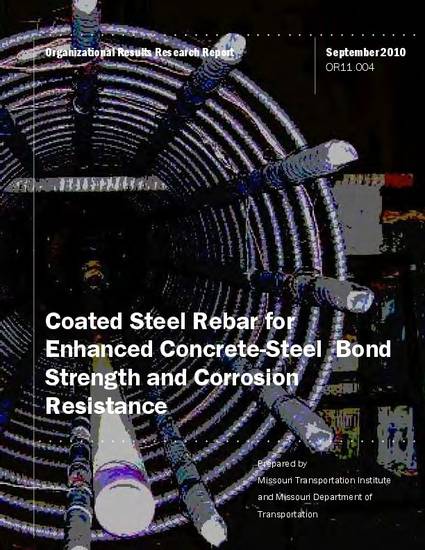
This report summarizes the findings and recommendations on the use of enamel coating in reinforced concrete structures both for bond strength and corrosion resistance of steel rebar. Extensive laboratory tests were conducted to characterize the properties of one- and two-layer enamel coatings. Pseudostatic tests were performed with pullout, beam and column specimens to characterize mechanical properties and develop design equations for the development length of steel rebar in lap splice and anchorage areas. The splice length equation was validated with the testing of large-scale columns under cyclic loading. For corrosion properties, ponding, salt spray, accelerated corrosion, potentiodynamic and electrochemical impedance spectroscopy (EIS) tests were conducted to evaluate the corrosion resistance and performance of enamel-coated steel and rebar. Experimental procedures and observations from various laboratory tests are documented in detail. The corrosion performances of enamel and epoxy coatings were compared. It is concluded that a one-layer enamel coating doped with 50% calcium silicate has improved bond strengths with steel and concrete but its corrosion resistance is low due to porosity in the coating, allowing chloride ions to pass through. Based on limited laboratory tests, a two-layer enamel coating with an inner layer of pure enamel and an outer layer of enamel and calcium silicate mixture has been shown to be practical and effective for both corrosion resistance and bond strength. A coating factor of 0.85 is recommended to use with the current development length equations as specified in ACI318-08. The large-scale column tests indicated that the column-footing lap splice with enamel-coated dowel bars had higher load and energy dissipation capacities compared to uncoated dowel bars. When damaged unintentionally, chemically reactive enamel coatings limit corrosion to a very small area whereas epoxy coatings allow corrosion expansion in a wide area underneath the coating.
- Enamel coating,
- bond strength,
- pullout test,
- beam test,
- column test,
- large-scale test,
- development length,
- lap splice,
- anchorage length,
- optical fiber sensor,
- corrosion resistance,
- corrosion resistance,
- salt spray,
- accelerated corrosion test,
- ponding test,
- potentiodynamic test,
- electrochemical impedance spectroscopy
Available at: http://works.bepress.com/richard-brow/183/
